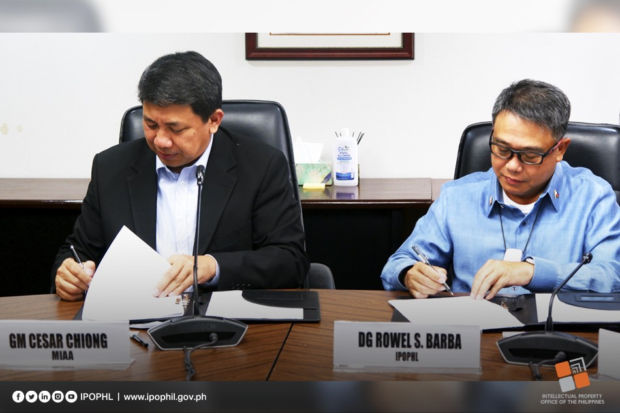
Manila International Airport Authority (MIAA) General Manager Cesar Chiong and Intellectual Property Office of the Philippines (IPOPHL) Director General Rowel Barba sign a memorandum of agreement to prevent the transport of fake and counterfeit goods. -Contributed photo
MANILA, Philippines -The Intellectual Property Office of the Philippines (IPOPHL) will train airport personnel to spot counterfeit and pirated goods as part of government efforts to prevent the transport of these illicit items.
The intellectual property (IP) rights body said last week that it signed a memorandum of understanding with the Manila International Airport Authority (MIAA) that will see both of them working together towards this campaign.
As we see no signs of the revenge travel easing, MIAA stands as a relevant partner to IPOPHL in ensuring tourists or returning residents observe our IP laws,” IPOPHL director general Rowel Barba said.
He made the statement against the backdrop of the expected influx of foreign tourists in the Philippines, noting that the Department of Tourism aims to attract five million tourists this year.
“Our MOU also assures that we have MIAA’s full cooperation in ensuring IP-safe travels. By ‘safe’, we mean destinations are safeguarded from counterfeit goods. We achieve this by jointly developing efficient measures to thwart the importation, exportation and sale of such goods through and at the airport, all while keeping in mind the convenience of our travelers,” Barba said further.
Aside from identifying counterfeit goods, the IPOPHL said the planned training will strengthen airport authorities’ understanding of IP laws, rules and regulations,
Despite this, the IPOPHL chief said that the partnership will not add tedious processes and requirements that will burden travelers.
Aside from the cooperation between the two government agencies, the agreements will also see them working with the National Committee on IP Rights (NCIPR).
Both the MIAA and IPOPHL will also share critical information and statistics to monitor the movement of counterfeit goods and help other enforcement agencies in their surveillance and investigation of identities involved in these illicit activities.
IPOPHL cited section 118 of the Republic Act No. 10863 or the Customs Modernization and Tariffication Act (CMTA) of 2016, reiterating that IP infringing goods are prohibited from being imported and exported.
It said that any person found violating the CMTA could face penalties of P100,000 to P300,000, as well as imprisonment of 31 days to one year.
Counterfeit and pirated goods remain a problem in the Philippines, with the Greenhills Shopping Center in San Juan City included recently under the piracy and counterfeiting watchlist of the United States Trade Representative’s (USTR).
The report mentioned that many of the goods sold in the popular shopping destination — such as electronics, perfumes, watches, shoes, accessories and fashion items — are suspected of being counterfeits or pirated products.

